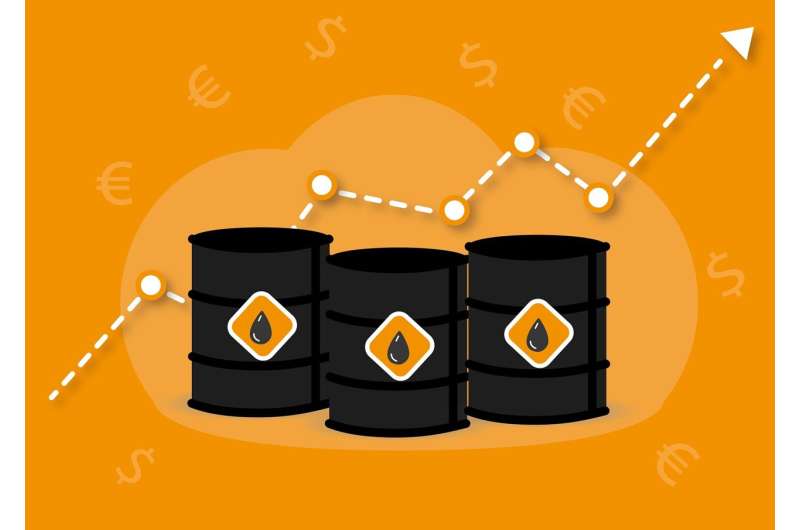Sanctions on Russia are increasing, not decreasing, its revenue

The European Union has just , including a price cap on oil sales, following the United States' Sept. 30 announcement of new economic sanctions. Both announcements are in response to .
The is to cripple Russia's capacity to wage war and reduce Vladimir Putin's access to the materials and financing necessary to fight.
However, because there are still countries willing to purchase Russia's petroleum products, sanctions are increasing Russia's revenue, not decreasing it.
Worse yet, the sanctions are driving up global oil and natural gas prices, causing spikes in inflation worldwide and, ironically, reducing the world's access to .
Widespread impact from sanctions
In early March, the sanctions on Russia's oil sector had driven and the price of natural gas in Europe . In late August, the price of natural gas lowered to .
As the winter approaches, , Global Research Scholar at the Center on Global Energy Policy of Columbia University, stated that current natural gas prices of US$300 per barrel could generate not only a natural gas crisis, but also a power crisis.
This increase has had widespread effects beyond the oil and natural gas industry, impacting , , and .
There's concern that the monetary policies implemented to contain those inflationary effects could that have been previously directed to green energy investments.
Another concern is that some countries will , putting energy security before energy transition.
Sanction picking is ineffective
Unlike previous "one-size-fits-all" sanctions on Iran and Venezuela, countries boycotting Russia are . All major oil importers will need to reject Russia's oil exports for the sanctions to be effective, .
Christof Rühl, a senior research scholar at Columbia University, has described this "sanction-picking" as a reckless gamble. He's warned that energy sanctions will backfire, causing oil prices to surge, which will be economically detrimental to sanctioning countries.
The perception that sanctions on Russia's oil will economically restrain Russia . The , warning that it could result in elevated oil prices that would benefit Russia but be detrimental to the global economy.
Although Russia's crude oil has been sold at a discount this year, the price is still higher than before the pandemic. This means Russia is still making more than the and international financial obligations.
There is also the issue of Russian oil being traded under the radar. This could result in the emergence of three distinct groups: countries that are willing to trade with Russia, countries that are energy-independent of Russia and countries that are not energy secure and must take a neutral position. This would support further sanction-picking and .
Reorienting international trade
Despite the sanctions, . This is because although trading firms have ceased new business with Russia, they continue to . Those contracts .
. Some of Russia's crude oil intended for Europe will be . Refineries, , are still willing to buy discounted Russian oil.
To wean itself off Russian exports, with supplies from the Middle East and Asia to the extent that their contractual commitments, refining configuration and import capacity permit. One outcome of this trade reshuffling is that .
Russia is resilient against sanctions
While , rather than their gas sector, will be more effective, this isn't the case. The argument that oil is Russia's biggest source of income is not supported by .
The World Bank concentration index indicates that . To put that in context, Saudi Arabia was in the top 20 percent of least diversified economies with a 0.55 concentration index.
Russia has also since .
This means that imposing sanctions on Russia's oil sector will have limited effects on Russia's economy.
What can be done?
The sanctions against Russia are strangling an important international source of energy, critical metals and minerals, causing non-renewable and green energy shortages, and driving up inflation. Given the role Russia plays in energy supply, the global economy .
Ultimately, the impact of oil sanctions on Russia is limited, while repercussions on the global economy and countries' and transition are severe.
As Nikos Tsafos, the previous energy chair at the Center for Strategic and International Studies : "A weapon is most useful when aimed at something—it is not clear what the western weaponization of energy exports is meant to accomplish exactly."
It is time to evaluate the economic costs of the sanctions on the world and on Russia. for the public in many countries. There is room for political leaders to make the case that some sanctions are not working and should be changed.
Provided by The Conversation
This article is republished from under a Creative Commons license. Read the .![]()




















